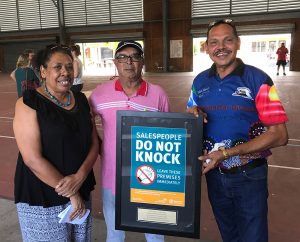Palm Island officially became a Do Not Knock informed community this month with the unveiling of new high-profile signage at a community event.
The Do Not Knock program aims to deter unscrupulous door-to-door traders with prominent signage reminding travelling salespeople of their responsibilities and obligations when trading door-to-door.
Residents are also offered free do-not-knock stickers for their homes. Under the Australian Consumer Law it is illegal for door-to-door traders to approach a property with a do-not-knock notice.
Local mayor Alf Lacey welcomed the Do Not Knock informed communities program to Palm Island and said the signage sent a strong reminder to any door-to-door traders.
“High pressure sales tactics will not be tolerated by residents,” Mayor Lacey said.
“The signage is also a great reminder to residents that it’s important for them to know their consumer rights, including it’s OK to say no to unwanted goods or services.”
Door to door provisions apply to approaching people at their home or in a public place.
The Do Not Knock informed communities program was developed after reports of unscrupulous door-to-door traders targeting Indigenous consumers in north Queensland, in some instances leading to consumers experiencing financial hardship.
 The expansion of the program to Palm Island is a joint initiative of Palm Island Aboriginal Shire Council, the Queensland Office of Fair Trading (QOFT), Australian Competition and Consumer Commission (ACCC) and Indigenous Consumer Assistance Network (ICAN).
The expansion of the program to Palm Island is a joint initiative of Palm Island Aboriginal Shire Council, the Queensland Office of Fair Trading (QOFT), Australian Competition and Consumer Commission (ACCC) and Indigenous Consumer Assistance Network (ICAN).
Fair Trading Executive Director Brian Bauer said the program empowers residents by making it easier for them to avoid having unwanted door-to-door traders at their homes.
“It can be difficult if a door-to-door trader persists with high pressure sales tactics,” Mr Bauer said. “Having a do-not-knock sticker at your front door means an uninvited trader cannot approach your home.”
ICAN Director, Velma Gara said the signage and stickers are important because they provide protection for our mob, that have a hard time saying NO.
“We sign on the dotted line, just to get them out the door and end up paying thousands over time for a product that is only worth a fraction,” said Ms Gara. “This is the main reason why door-to-door traders prey on Indigenous communities.”
The Do Not Knock informed community program launched in Wujal Wujal in April 2016 and has now expanded to Yarrabah, Hope Vale and Palm Island in 2017.
At the other end of the east coast a new report ‘Knock it off!’ was released by the Consumer Action Law Centre and legal centre partners last week. The report explores door-to-door sales and consumer harm in Victoria, including the inadequacy of current laws to stop door-to-door rip-offs from occurring, especially among the elderly, culturally diverse and Aboriginal communities. You can download a copy of the report here.
Free ‘do-not-knock’ notices are available to order from the QOFT’s website at www.qld.gov.au/fairtrading.
More information on consumer rights is available from www.qld.gov.au/fairtrading or https://www.accc.gov.au/business/treating-customers-fairly/door-to-door-telemarketing-sales.
Indigenous consumers can also call the ACCC’s dedicated Indigenous infoline on 1300 303 143.

